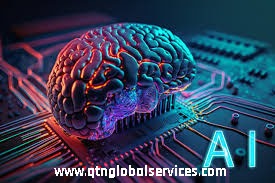Unleashing the Future of Innovation
The fusion of Artificial Intelligence (AI) and Information Technology (IT) has ignited a revolutionary spark across industries. From automation to advanced analytics, AI is reshaping the landscape of IT, propelling it towards unprecedented levels of efficiency and innovation. In this article, we delve into the pivotal role of Artificial Intelligence in IT technology, exploring its transformative impact and the limitless possibilities it holds.
Table of Contents
- Introduction
- Defining the Synergy: AI and IT
- Enhancing Automation and Efficiency
- Intelligent Data Analysis and Insights
- Personalized User Experiences of AI in IT Technology
- Cybersecurity Reinforcement
- Predictive Maintenance and Support
- Natural Language Processing (NLP) Advancements
- Cognitive Computing and Decision-Making
- Challenges and Ethical Considerations
- Harnessing AI’s Potential in IT
- AI-Driven Future: Adaptation and Collaboration
- Role of Artificial Intelligence in IT Technology
- Conclusion
- Frequently Asked Questions (FAQs)

Defining the Synergy: Artificial Intelligence and Information Technology
Artificial Intelligence involves the creation of systems that mimic human intelligence, while IT encompasses the management of information through technology. The combination of AI and IT creates an ecosystem where intelligent systems augment human capabilities and drive technological advancement.
Enhancing Automation and Efficiency
AI-powered automation is revolutionizing IT operations. Tasks such as software deployment, system monitoring, and routine maintenance can be efficiently handled by AI-driven systems, freeing up human resources for more strategic endeavors.
Intelligent Data Analysis and Insights
AI’s data processing capabilities enable organizations to extract valuable insights from massive datasets. This assists in identifying patterns, trends, and opportunities, ultimately guiding data-driven decision-making.
Personalized User Experiences of AI in IT Technology
Artificial Intelligence tailors user experiences by analyzing user behavior and preferences. From personalized content recommendations to chatbots providing instant customer support, AI in IT Technology enhances user engagement and satisfaction.
Cybersecurity Reinforcement
AI’s ability to identify anomalies and patterns helps in early detection and prevention of cyber threats. Machine learning algorithms can adapt to new threats, strengthening an organization’s cybersecurity posture.

Predictive Maintenance and Support
In IT infrastructure, AI predicts and prevents potential system failures. Predictive analytics can forecast hardware malfunctions, enabling proactive maintenance and minimizing downtime.
Natural Language Processing (NLP) Advancements
NLP enables machines to understand and generate human language. AI-driven chatbots and virtual assistants enhance communication, streamline interactions, and facilitate efficient information retrieval.
Cognitive Computing and Decision-Making
AI aids in complex decision-making by processing vast amounts of data and providing recommendations. Cognitive computing systems simulate human thought processes, assisting professionals in critical choices.
Challenges and Ethical Considerations
AI adoption in IT comes with challenges such as data privacy, bias in algorithms, and job displacement. Ethical considerations must guide the development and deployment of AI solutions.
Harnessing AI’s Potential in IT
To leverage AI’s potential, IT professionals must upskill and embrace the technology. Collaborative efforts between AI experts and IT practitioners lead to innovative solutions and improved processes.
AI-Driven Future: Adaptation and Collaboration
As AI continues to evolve, IT professionals must remain adaptable and embrace continuous learning. Collaborative efforts between AI and IT experts will pave the way for groundbreaking advancements.

Role of Artificial Intelligence in IT Technology
The application of artificial intelligence to the management of information technology on a multi-platform basis is known as AI for IT operations. Big Data and machine learning are the two primary technologies utilized in AIOps. These use online and historical data to automate decision-making and data processing.
Conclusion
The marriage of Artificial Intelligence and Information Technology is forging a new era of technological transformation. From revolutionizing automation to revolutionizing decision-making, AI’s impact on IT is far-reaching and game-changing. As we navigate this exciting journey, the synergy between these two disciplines will shape the future of innovation and drive us towards new horizons.
Frequently Asked Questions (FAQs)
Q1: What’s the difference between AI and traditional programming? A: Traditional programming uses predefined rules, while AI employs data and learning to make decisions.
Q2: Can AI replace human IT professionals? A: AI augments human capabilities but doesn’t replace them. IT professionals will focus on managing AI systems and driving innovation.
Q3: Is AI suitable for all IT tasks? A: AI is best suited for repetitive tasks, data analysis, and decision support. Complex tasks that require creativity and critical thinking still require human involvement.
Q4: How does AI impact IT security? A: AI enhances IT security by identifying threats, analyzing patterns, and predicting potential breaches, thereby strengthening cybersecurity measures.
Q5: What’s the future of AI in IT? A: The future involves increased integration of AI in IT operations, leading to optimized efficiency, enhanced user experiences, and data-driven decision-making.





